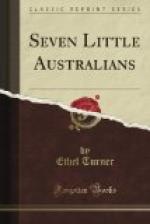He had offered to send the six of hem to boarding school when he brought home his young girl-wife, but she would not hear of it.
At first they had tried living in the barracks, but after a time every one in the officers’ quarters rose in revolt at the pranks of those graceless children, so Captain Woolcot took a house some distance up the Parramatta River, and in considerable bitterness of spirit removed his family there.
They liked the change immensely; for there was a big wilderness of a garden, two or three paddocks, numberless sheds for hide-and-seek, and, best of all, the water. Their father kept three beautiful horses, one at he barracks and a hunter and a good hack at Misrule; so, to make up, the children—not that they cared in the slightest—went about in shabby, out-at-elbow clothes, and much-worn boots. They were taught—all but Pip, who went to the grammar school—by a very third-class daily governess, who lived in mortal fear of her ignorance being found out by her pupils. As a matter of fact, they had found her out long ago, as children will, but it suited them very well not to be pushed on and made to work, so they kept the fact religiously to themselves.
CHAPTER II Fowl for Dinner
“Oh, don’t the days seem lank and long
When all goes right and nothing wrong;
And isn’t your life extremely flat
With nothing whatever to grumble at?”
I hope you are not quite deafened yet, for though I have got through the introductions, tea is not nearly finished, so we must stay in the nursery a little longer: All the time I have been talking Pip has been grumbling at the lack of good things. The table was not very tempting, certainly; the cloth looked as if it had been flung on, the china was much chipped and battered, the tea was very weak, and there was nothing to eat but great thick slices of bread and butter. Still, it was the usual tea, and everyone seemed surprised at Pip’s outburst.
“My father and Esther” (they all called their young stepmother by her Christian name) “are having roast fowl, three vegetables, and four kinds of pudding,” he said angrily; “it isn’t fair!”
“But we had dinner at one o’clock, Pip, and yours is saved as usual,” said Meg, pouring out tea with a lavish allowance of hot water and sugar.
“Boiled mutton and carrots and rice pudding!” returned her brother witheringly. “Why shouldn’t we have roast fowl and custard and things?”
“Yes, why shouldn’t we?” echoed little greedy Bunty; his eyes lighting up.
“What a lot it would take for all of us!” said Meg, cheerfully attacking the bread loaf.
“We’re only children—let us be thankful for this nice thick bread and this abundance of melting butter,” said Judy, in a good little tone.
Pip pushed his chair back from the table.
“I’m going down to ask for some roast fowl,” he said, with a look of determination in his eyes. “I can’t forget the smell of it, and they’d got a lot on the table—I peeped in the door.” ’




